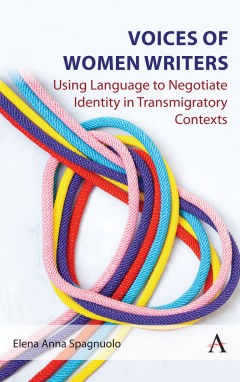Voices of Women Writers
Using Language to Negotiate Identity in (Trans)migratory Contexts
By Elena Anna Spagnuolo
Other Formats Available:
- About This Book
- Reviews
- Author Information
- Series
- Table of Contents
- Links
- Podcasts
About This Book
This book investigates the practice of writing and self - translating phenomenon within the context of mobility, through the analysis of a corpus of narratives written by authors who were born in Italy and then moved to English-speaking countries. Emphasizing Writing and self-translating as practices, which exist in conjunction with a process of redefinition of identity, the book illustrates how these authors use language to negotiate and voice their identity in (trans)migratory contexts.
(Trans)migration refers to a process through which mobile subjects are “firmly rooted in their new country,” but at the same time maintain “multiple linkages to their homeland” (Schiller, Basch, and Szanton Blanc 1995: 48). The (trans)migrant experience is at the core of the writing and self-translating performances of the authors. It constitutes the reason behind their writing and self-translating. The need to express their voice in both languages leads them to produce a double text. Indeed, they attempt to achieve a simultaneous existential embeddedness, by means of a simultaneous linguistic embeddedness. On the other hand, the (trans)migrant experience constitutes the object of their activity. It is recreated in the text, on both the level of content and language. From a thematic perspective, it appears in the rethinking of a number of traditional tropes. From a linguistic perspective, it emerges through code-switching, as well as through a specific form of self-translation, which is located at the juncture between writing and translating.
The book investigates the experience of transmigration in relation to what Yildiz calls “the monolingual paradigm” (2012). According to this paradigm, individuals possess one exclusive mother tongue—the language we learn from our parents and grow up with. The mother tongue ties individuals to specific linguistic, cultural, and physical spaces, defining their identity within precise borders and boundaries. Nonetheless, transmigration challenges the monolingual paradigm, as transmigrants forge associations with multiple spaces. Experiencing the “impossibility of the monolingual paradigm” (Yildiz 2012), the authors resort to writing and Self-translating to recreate their transmigrant experience on the page and challenge monolingual assumptions about language and identity. Indeed, their literary productions express and exploit the creative and existential possibilities of a life at the crossroads.
Reviews
“In this elegantly written book, Elena Spagnuolo looks at the voices of four female writers. She questions how their multilingual identities are made even more complex by the act of self-translation, thereby highlighting new, probing analytical lenses to explore and make sense of the power translations hold in shaping our worldviews.” —Francesca Billiani, Professorof Italian, University of Manchester, UK.
“An engaging book on the practice of self-translation as part of the process of creative writing among immigrant women authors who negotiate different identities, languages and cultures. Do we abandon the old country but keep the mother tongue? The detailed arguments here are accessible for both scholars and students.” —Joseph Pivato, Ph.D., Professor of Comparative Literature, Athabasca University, Canada.
“A timely and compelling publication exploring the relationship between language, identityand ethnicity through the migrant narratives of four Italian-born authors who moved toEnglish-speaking countries: Gianna Patriarca, DôreMichelut, Licia Canton and Francesca Duranti. Drawing a parallel between ‘mother and mother (tongue, land)’, the author offers a gendered perspective on the works of these transmigrant writers, whose ‘specific and identitarian discourse’ opens up new possibilities for a transmigrant existence.” —Lucia Aiello, Senior Lecturer, Department of Language and Linguistic Science, University of York, UK.
Author Information
Elena Anna Spagnuolo received her PhD in Italian Studies from the University of Manchester. She works as an Italian language instructor at Aberystwyth University, and as Research Fellow at the Centre for the Movement of People.
Series
Table of Contents
Introduction; 1. Revoicing Female Migrant Identities through Creative Multilingualism; 2. Gianna Patriarca: Self-Translating as a Strategy of Re-grounding; 3. DôreMichelut: Coming to Terms with the Mother Tongue;4. Licia Canton: Rewriting the Italian Mother (Tongue, Land)’s ;5. Francesca Duranti: ‘Trans-Writing’ the Self through Acts of Narration and Acts of Living ; Conclusion; References
Links
Stay Updated
Information
Latest Tweets



